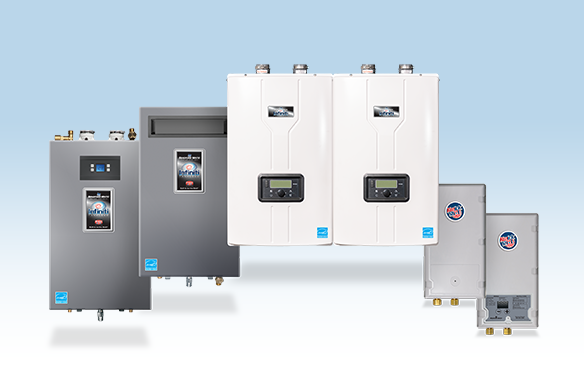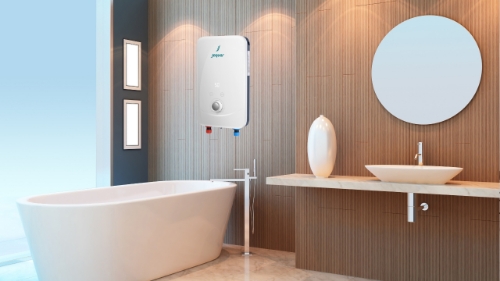Which On-Demand Water Heaters Grant Unmatched Benefits
Which On-Demand Water Heaters Grant Unmatched Benefits
Blog Article
Have you been looking for details around Unveiling the Hot Trend: The Benefits of Tankless Water?

In a world where ease and performance preponderate, it's not a surprise that homeowners are frequently on the lookout for smarter methods to handle their home's energy usage and convenience. One innovation that has progressively gotten appeal is the tankless water heater. However exactly what makes these systems stand out from the standard tank-based versions the majority of us grew up with? Let's dive in and discover the benefits of tankless water heaters, helping you determine if it's time to make the button in your home.
Intro
Photo this: you step into the shower after a lengthy day, expecting a comforting waterfall of hot water, just to be welcomed by icy droplets since the last individual utilized it all up. Sound familiar? Conventional hot water heater keep a fixed quantity of hot water, implying you go to the grace of that container's supply. Tankless systems, on the other hand, heat water on demand. No more running out mid-shower, no more wrestling with routines just to ensure hot water is available.
Understanding Tankless Water Heaters
What Are Tankless Water Heaters?
Tankless hot water heater, occasionally called on-demand or immediate water heaters, offer hot water only as it's required. Rather than storing gallons of pre-heated water, these devices kick right into action the minute you turn on the tap. Water goes through a heat exchanger, heating up in real-time, meaning you get an undisturbed flow of warm water without the need for a huge storage tank resting lazily by.
How Do They Vary from Traditional Solutions?
Typical heating units hold a reservoir of warm water, making use of energy to keep that storage tank at a regular temperature. Tankless devices eliminate the standing supply, reducing lost power and the bulky footprint of a big cyndrical tube. Basically, you're updating from a "accumulation" attitude to a "made-to-order" strategy.
Usual Sorts Of Tankless Devices
Tankless water heaters typically come in two ranges: gas and electrical. Gas versions often tend to provide higher flow prices, ideal for larger homes, while electric models typically serve smaller sized homes and are usually less complicated to install. In addition, some systems are designed for point-of-use (offering one component) while others can handle the whole home's hot water demands.
Key Benefits of Tankless Water Heaters
1. Countless Hot Water Supply
Ever before had to set up showers so everybody obtains their fair share of hot water? With tankless, that comes to be a thing of the past. As long as the heating system's circulation ability isn't surpassed, you can take back-to-back showers without turning into a popsicle.
2. Power Effectiveness and Expense Financial Savings
No more heating up a giant storage tank's well worth of water and maintaining it warm all day. Tankless heaters decrease standby energy losses, which can reduce utility costs. While the first price may be higher, the lasting cost savings usually justify the financial investment.
3. Space-Saving Style
If your home is short on storage, getting rid of the bulky container liberates important room. Tankless systems are portable and can typically be mounted on walls, stashed in corners, or mounted in tight utility storage rooms without hogging the whole space.
4. Longer Life-span
A well-kept tankless water heater can outlast its tank-based relative. Typical tanks could last 10-15 years, while tankless designs can keep downing along for twenty years or even more, making them a strong investment over time.
5. Improved Water High Quality
Saving water in a tank can often lead to sediment buildup or a slightly "off" preference. With tankless systems, fresh water is heated instantly, reducing the possibilities of sediment build-up and potentially providing cleaner-tasting water.
Considerations Before Changing
Though the benefits are engaging, it's smart to think about a few factors prior to completely committing.
Initial Financial Investment Expenses
Tankless heating units commonly come with a higher ahead of time price. In between the device itself and prospective setup modifications, the initial price could provide you sticker shock. But remember to watch it as a lasting financial investment.
Installment Requirements
Depending on your home's framework, you may need added electrical ability or gas line upgrades. Guarantee you comprehend the installation requirements and speak with an expert to stay clear of surprises.
Examining Your Home's Water Usage Patterns
If your house all at once makes use of numerous components with high hot water demand, see to it the system's circulation rate fulfills your needs. Knowing your usage patterns assists you pick the best dimension and type of tankless heating unit.
Upkeep and Treatment Tips
Tankless systems are fairly low maintenance, but they aren't set-it-and-forget-it appliances.
Normal Cleaning and Descaling
Hard water minerals can accumulate in the warm exchanger, impacting effectiveness. Regular descaling (usually suggested annually) maintains the device running at peak performance.
Yearly Specialist Inspections
A yearly checkup from a specialist ensures minor problems are captured early. They'll analyze the device's efficiency, look for leaks, and aid maintain optimal effectiveness.
Making Sure Correct Ventilation
For gas designs, proper air flow is essential to safely expel exhaust gases. See to it airing vent systems are clean and appropriately installed to avoid any kind of potential security dangers.
Comparing Different Brands and Models
Not all tankless water heaters are created equal.
Researching Reputable Manufacturers
Seek reputable brand names with a history of producing quality systems. A reputable manufacturer usually provides much better customer support and longer service warranties.
Checking Out Testimonials and Individual Responses
User evaluations and feedback from neighbors or good friends who have gone tankless can provide valuable insights. Often, real-life experiences can be extra telling than advertising sales brochures.
Setup: Do It Yourself or Expert?
While some homeowners enjoy dealing with tasks themselves, tankless installation might not be the very best time to break out the toolbox.
Benefits and drawbacks of DIY Setup
A do it yourself install might save money, but it includes risks. Wrong installment can cause ineffectiveness or security issues. If you're handy and have experience, it might be viable-- however proceed with care.
When to Call a Specialist Plumbing Professional
For many, calling a professional makes sure everything's done properly. A professional plumbing technician comprehends local codes, sizing requirements, and venting specifications, lowering the threat of mishaps.
Maximizing Efficiency
You've invested in a tankless unit-- currently optimize its performance.
Optimal Temperature Setups
Lots of people establish their units in between 120-140 F. Readjusting the temperature can enhance comfort and savings. Experiment to find a sweet place that doesn't waste power.
Coupling With Low-Flow Fixtures
Intend to stretch your system's capabilities? Consider installing low-flow showerheads and taps. They reduce water use, permitting your tankless system to deliver a steady stream of warm water without stressing.
Ecological Influence
Tankless hot water heater align with greener living objectives.
Minimized Carbon Footprint
By utilizing much less energy and just home heating water as required, tankless systems can decrease your home's carbon impact, reducing your ecological effect.
Saving Natural Resources
Much less power consumption and much less lost warm water equate right into fewer natural deposits being made use of, an ecological win-win.
That Benefits The Majority Of from Tankless Heating units?
The beauty of tankless heaters is that they can fit a range of homes.
Large Households vs. Single Passengers
Huge family members may enjoy the limitless hot water supply, while solitary occupants appreciate the energy financial savings from not heating a whole container for just a single person's early morning shower.
Property Owners with Minimal Room
If your home is short on square footage, shedding the large storage tank maximizes space for various other essentials-- or perhaps just more breathing space.
Eco-Conscious Consumers
Going tankless aligns with environmentally friendly worths, guaranteeing you're not squandering power or resources.
Future Trends in Tankless Hot Water Heater
The globe of home appliances is ever-evolving, and tankless hot water heater are no exception.
Smart Home Integration
Picture readjusting your hot water heater's temperature level through an application or receiving upkeep informs on your phone. As smart home tech advances, we'll see more connectivity and ease.
Improvements in Technology
R&D is regularly enhancing heat exchangers, making systems more effective and long lasting. Future models may be even quieter, more portable, and much better fit for varying environments.
Verdict
Picking a tankless hot water heater is more than just updating your home's warm water system; it's purchasing long-term comfort, power effectiveness, and a greener way of life. By considering your home's water usage, being mindful of installment requirements, and devoting to routine maintenance, you can enjoy a consistent stream of hot water without the baggage of a cumbersome storage tank. As innovation advances, you can anticipate even smarter, a lot more effective tankless options that not only make your life easier however additionally profit the world.
Why You Should Consider a Tankless Water Heater for Your Home
Energy Efficiency and Cost Savings
Tankless water heaters, also known as on-demand water heaters, heat water only when needed. This means they don't waste energy keeping a tank of water hot constantly. This efficiency translates into substantial cost savings on your monthly energy bills.
Endless Hot Water Supply
One of the significant advantages of tankless water heaters is their ability to provide a continuous supply of hot water. Traditional tank water heaters have a limited capacity and can run out of hot water, especially during peak usage times. In contrast, tankless water heaters can provide an endless stream of hot water, making them ideal for larger families or homes with high water usage.
Space-Saving Design
Tankless water heaters are compact and take up significantly less space compared to traditional tank heaters. They can be installed on walls, under cabinets, or even outside, freeing up valuable space in your home. This makes tankless water heaters a great option for smaller homes or properties with limited space for a traditional water heater.
Longer Lifespan and Lower Maintenance
Tankless water heaters typically have a longer lifespan compared to traditional tank heaters. They can last up to 20 years or more with proper maintenance. Additionally, tankless systems are designed with replaceable parts, which can extend their lifespan further and reduce long-term maintenance costs.
Environmentally Friendly
Reducing energy consumption not only saves you money but also benefits the environment. Tankless water heaters contribute to a smaller carbon footprint by using less energy to heat water. Their energy efficiency and ability to minimize standby heat loss make them an eco-friendly choice for environmentally conscious homeowners.
Customized Temperature Control
Tankless water heaters offer precise temperature control, allowing you to set the desired temperature to meet your specific needs. This level of customization ensures you always have water at the perfect temperature for your comfort and usage requirements.
https://beantownservices.com/blog/consider-tankless-water-heater-for-your-home

I was made aware of that report about through a friend on another website. Do you know anybody else who is curious about the topic? Please feel free to share it. Thanks for going through it.
Free Quote Report this page